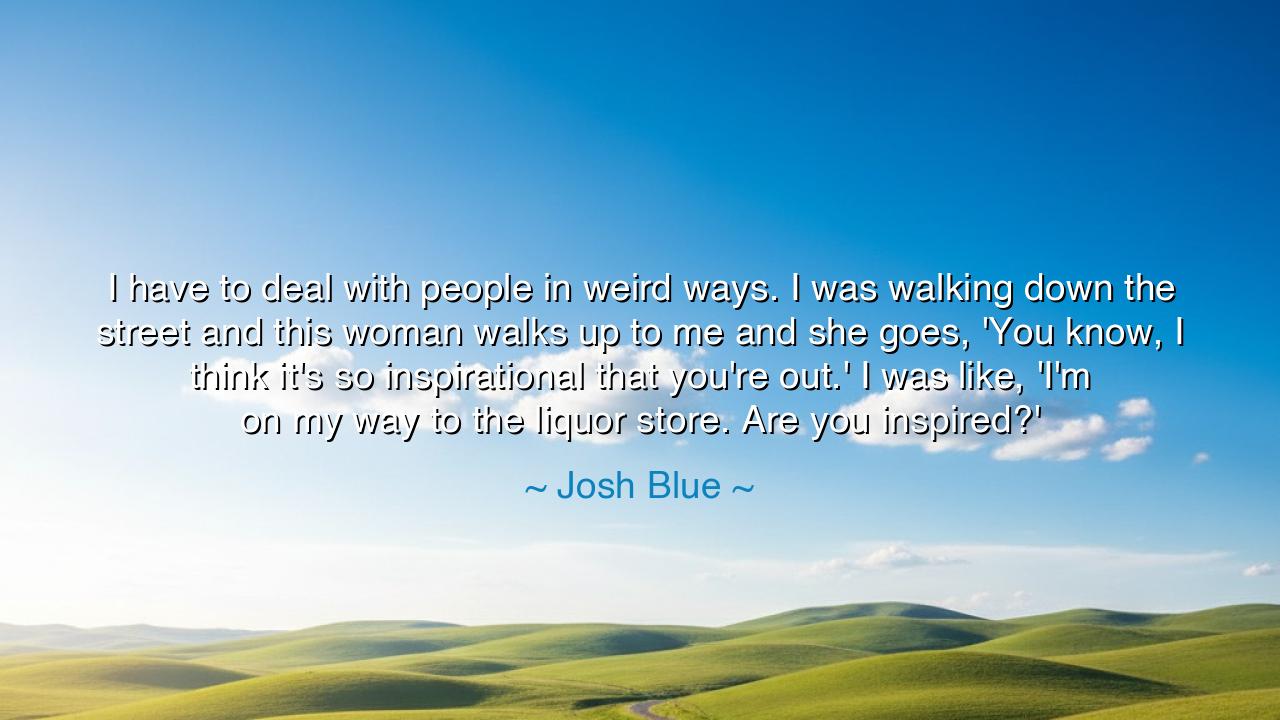
I have to deal with people in weird ways. I was walking down the
I have to deal with people in weird ways. I was walking down the street and this woman walks up to me and she goes, 'You know, I think it's so inspirational that you're out.' I was like, 'I'm on my way to the liquor store. Are you inspired?'






In the clever, self-aware words of Josh Blue, the comedian who turned his difference into brilliance, we hear both laughter and a deeper truth: “I have to deal with people in weird ways. I was walking down the street and this woman walks up to me and she goes, ‘You know, I think it's so inspirational that you're out.’ I was like, ‘I'm on my way to the liquor store. Are you inspired?’” The humor shines bright, yet beneath it lies a mirror to society — a reflection of how we often mistake the ordinary for the extraordinary, how we project pity and admiration where what truly exists is simply human life. Through jest, Blue reveals not only the absurdity of perception but the quiet wisdom of authenticity.
The origin of this quote is rooted in Josh Blue’s own experience as a stand-up comedian living with cerebral palsy, a condition that affects muscle coordination and movement. For years, Blue has used comedy to confront and disarm the world’s assumptions about disability, not with anger, but with laughter — the universal language of humility and truth. In this moment of humor, his wit exposes a subtle yet powerful lesson: that people often elevate those with visible differences to the realm of “inspiration,” not because of understanding, but because of discomfort. Blue’s retort, though light, strikes deep — a reminder that to be seen as human is far greater than to be seen as a symbol.
To grasp the deeper meaning of Blue’s words, we must first understand the nature of perception and projection. Human beings, in their uncertainty, often create stories to explain what they cannot easily comprehend. When one sees someone living joyfully despite challenge, it is easier to call them “inspirational” than to examine why we see them as separate. Blue, in his gentle mockery, teaches that true equality is not admiration from a distance, but acceptance without condition. His humor breaks down the wall between “us” and “them,” reminding all who listen that difference is not tragedy — it is the raw material of life itself.
There is an ancient parallel to this wisdom. Consider Socrates, who was mocked and misunderstood for his peculiar ways. To the Athenians, he seemed strange — a man who walked barefoot through the marketplace, questioning the proud and powerful. Yet through humor, irony, and relentless truth, he revealed the foolishness of pretense. Like Blue, Socrates used the art of self-deprecating wit to teach humility to those who presumed superiority. Both men, in their own times, understood that laughter can pierce arrogance and awaken empathy far more effectively than rebuke. The fool, it turns out, is often the wisest man in the room.
Blue’s encounter with the woman on the street speaks also to the burden of expectation placed upon those who are “different.” Society often demands that those who struggle must do so gracefully, inspirationally, as if their existence alone must justify their worth. But Blue’s humor tears this mask apart. “I’m on my way to the liquor store,” he quips — grounding the divine in the mundane, the symbol in the human. In that one sentence, he reminds the listener that people with disabilities are not angels or martyrs, but humans with ordinary desires, flaws, and joys. His laughter becomes a sacred act of rebellion — the refusal to be reduced to a narrative of pity or perfection.
Through this lens, Blue’s comedy is not mere entertainment; it is liberation. He frees both himself and his audience from illusion — from the illusion that suffering must always be noble, that difference must always be inspiring. In his defiant humor, there is power. It is the same power that lived in Helen Keller, who once said, “I long to accomplish great and noble tasks, but it is my chief duty to accomplish humble tasks as though they were great and noble.” Both Keller and Blue shared this truth: that the essence of humanity lies not in grand gestures, but in simple, unfiltered existence — to live one’s truth openly, without apology, is the highest form of inspiration.
Let this, then, be the lesson drawn from Josh Blue’s words: do not worship others for being human — understand them, respect them, and walk beside them. Let your admiration not be rooted in difference, but in shared experience. Laugh together, not at one another; listen to understand, not to define. True inspiration does not come from seeing others live despite hardship — it comes from recognizing that we all, in our own ways, are struggling, surviving, and laughing through life’s absurdities.
And so, dear listener, remember this ancient wisdom dressed in modern wit: humor is the bridge between misunderstanding and empathy. Josh Blue teaches that laughter, when used with honesty and courage, can dissolve fear and heal perception. Look not for heroes in others’ challenges, but for brothers and sisters in their humanity. For when we can laugh together at the world’s strange beauty, without hierarchy or pity, we become what we were always meant to be — equals, united not by perfection, but by the eternal, glorious imperfection of being alive.






AAdministratorAdministrator
Welcome, honored guests. Please leave a comment, we will respond soon